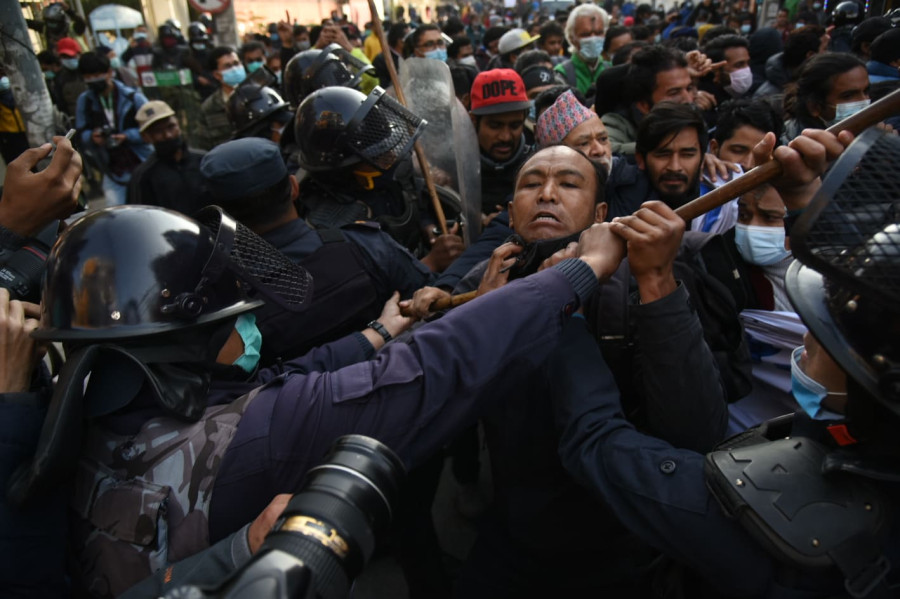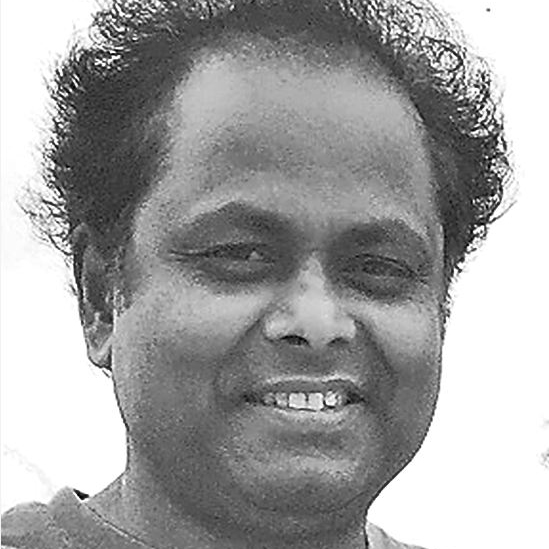Columns
Threat to Nepal’s hard-fought democratic ideals
The civil society movement must insist on punishing Oli, but it must also insist that a new political culture develops.
Pramod Mishra
The Oli government’s repressive actions and his new-found religious fervour have begun together. He uses the ruse of religious rhetoric to deflect from his nefarious violation of the constitution and brutal repression of the voice of Nepal’s writers, academics, intellectuals and civil society members. He is, after all, a clever man—clever but evil, as Plato would like to say about a sharp man.
While his wasps were already at work on social media, trolling writers and intellectuals, on January 24 he unleashed his security forces on intellectuals, writers and civil society members who had taken out a peaceful protest march from a heritage site in the centre of Kathmandu to the Prime Minister’s official residence.
Well, Nepalis are no strangers to repression and assault by their government. But after having fought for a constituent assembly and a constitution written by people’s representatives—however flawed and truncated the constitution may be—and having transferred the sovereignty of the country from the palace to Parliament and making the country a republic, who would have thought that Parliament would unlawfully be dissolved and a puny, clever tongued Oli would set his shenanigans on the country’s nationally and internationally educated and known writers and intellectuals?
Signs of the prime minister’s hidden fangs and claws were apparent as soon as he whipped the country into a populist frenzy in the name of nationalism by baiting India and duping the country in giving his party near two-thirds majority in the federal parliament three years ago. The simple Nepalis were taken in by his glib tongue, poor health and unscrupulous tactics. And Nepalis, entrenched in the old regime of caste, ethnicity and privilege, found Oli as their messiah because the ship of their centuries-old unearned privilege was sinking. At the same time, average Nepalis were too busy with their meagre lives in the midst of the pandemic and too easily entertained by Oli’s glib tongue that they didn’t know that this is no sign of a political leader who delivers. In fact, clever words have come in literature and history from some of the world’s notorious villains, such as Iago, Lucifer, Goebbels and Shakuni.
So, Nepalis find themselves in the middle of another political crisis on top of the global pandemic. They had thought that their job was done once they had waged the second people’s movement in 2006. Now, the ball is in the Supreme Court. And lawyers, writers, intellectuals who speak as citizens and who were instrumental in the second people’s movement do not trust even the judiciary.
There is so much speculation as to what the country’s apex court would do. So many conspiracy theories swirling around in Kathmandu. Inheritors of a culture of rumours about this remote kingdom’s secretive palaces and their intrigues, Nepalis can’t believe that the Supreme Court justices would follow the letter of the constitution and defend it. Accustomed to the corrupt ways of Nepal’s caste-based officialdom, they can’t trust even the justices of the highest court to do the right thing. They suspect Oli to have made a ‘setting’ with the other branch of the state—the judiciary—to achieve his nefarious goals of destroying Parliament. They think Oli has set it all up with India, China and the United States to make his move. Otherwise, how can a puny man like him dare do such a thing as overturning the people’s long-earned constitution and democracy? And the Supreme Court itself, by dillydallying on such an important case, is feeding on the suspicion and paranoia of the citizenry. Nepalis are once bitten twice shy in matters of the state.
This is indeed a sad state of affairs in a country already plagued by myriads of ills. But what is the way forward?
The civil society members must not stop until Parliament is restored and justice prevails. They should press forward. Pressing this twin principle means they must unflinchingly insist on the restoration of Parliament on one hand, and bring the all opposing, republican and democratic forces together and get a written commitment from them to restore justice, clean governance and transparency in all aspects of politics.
Restoration of Parliament will help save the constitution and the commitment from the political parties will reverse the regressive steps. A firm commitment to clean governance and transparency will help restore people’s faith in republicanism, secularism and federalism once again; in the past few years since Nepal was declared a republic, the political parties and their leaders (not just those in the government under Oli) did not insist on institutionalising the new structure.
The abolition of monarchy made them the guardians of the country. Secularism made them the preceptors and explainers of religious freedom, including Hinduism with all its virtues and vices. Federalism made them the monitors to make sure it was implemented effectively, giving good governance to the people. But they did none of these things. Instead, they invested all their energies to sharing the spoils of the state and government for their parties. They closed their eyes to misgovernance, corruption, injustice. Their primary concern was to get plump and powerful judiciary, police and other positions for their own people. The parties of the 1990s and early 2000s refused to give up their culture and corrupt practices. The Maoists’ entry into the mix, instead of infusing new blood, made even the viable newcomers sink with the old parties.
The civil society movement must insist on punishing Oli and restoring Parliament, but it must also insist that a new political culture develops in Nepal. Otherwise, republicanism, secularism and federalism—all three key aspects—will lose their shine with the people. You can’t eat and dress republicanism, secularism and federalism. Without a course correction of the first, the constitution will be gone and many new Olis will rise on the horizon. Without the second, many hyenas waiting in the wings will pounce on and make a kill. Champions of freedom and justice in Nepal must achieve both. If Trump can go, can Oli’s departure be far behind?




 11.12°C Kathmandu
11.12°C Kathmandu















